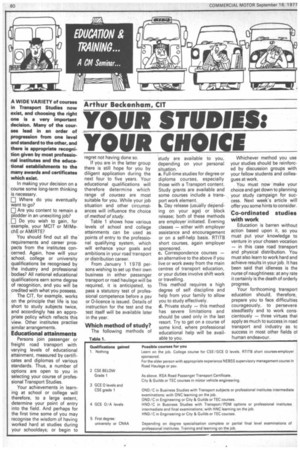Arthur Beckenham, CIT
Page 62

If you've noticed an error in this article please click here to report it so we can fix it.
UR STUDIES: YOUR CHOICE
A WIDE VARIETY of courses in Transport Studies now exist, and choosing the right one is a very important decision. Many of the courses lead in an order of progression from one level and standard to the other, and there is appropriate recognition given by most professio'nal institutes and the educational establishments to the many awards and certificates which exist.
In making your decision on a course some long-term thinking is necessary.
• Where do you eventually want to go?
Are you content to remain a plodder in an unexciting job? O Do you wish to gain, for example, your MCIT or M IMechE or AM I RTE?
You should find out all the requirements and career prospects from the institutes concerned. Again, how will your school, college or university qualifications be recognised by the industry and professional bodies? All national educational qualifications earn some degree of recognition, and you will be credited with what you possess.
The CIT, for example, works on the principle that life is too short to study subjects twice, and accordingly has an appropriate policy which reflects this view. Other institutes practise similar arrangements.
Educational attainments
Persons join passenger or freight road transport with varying levels of educational attainment, measured by certificates and diplomas of various standards. Thus, a number of Options are open to you in selecting your course of professional Transport Studies.
Your achievements in learning at school or college will therefore, to a large extent, determine your point of entry into the field. And perhaps for the first time some of you may recognise the wisdom of having worked hard at studies during your schooldays; or begin to regret not having done so If you are in the latter group there is still hope for you by diligent application during the next four to five years. Your educational qualifications will therefore determine which range of courses are most suitable for you. While your job situation and other circumstances will influence the choice of method of study.
Table 1 shows how various levels of school and college attainments can be used as points of entry to the professional qualifying system, which will enhance your goals and ambitions in your road transport or distribution career.
From January 1 1978 persons wishing to set up their own business in either passenger transport or road haulage will be required, it is anticipated, to pass a statutory test of profes sional competence before a psy or 0-licence is issued. Details of instruction for the test and the test itself will be available later in the year.
Which method of study?
The following methods of study are available to you, depending on your personal situation.
a. Full-time studies for degree or diploma courses, especially those with a Transport content. Study grants are available and some courses include a transport work element.
b. Day release (usually depending on your age) or block release; both of these methods are employer initiated. Evening classes — either with employer assistance and encouragement or on a self-help basis. RTITB short courses, again employer sponsored.
c. Correspondence courses — an alternative to the above if you live or work away from the main centres of transport education, or your duties involve shift work or travelling.
This method requires a high degree of self discipline and help from your family to allow you to study effectively.
d. Private study — this method has severe limitations and should be used only in the last resort. Try to get on a course of some kind, where professional educational help will be available to you. Whichever method you use your studies should be reinforced by discussion groups with your fellow students and colleagues at work.
You must now make your choice and get down to planning your study campaign for success. Next week's article will offer you some hints to consider.
Co-ordinated studies with work
Education is barren without action based upon it, so you must put your knowledge to venture in your chosen vocation — in this case road transport and physical distribution. You must also learn to work hard and achieve results in your job. It has been said that idleness is the nurse of naughtiness: at any rate it certainly is the death of orderly progress.
Your forthcoming transport education should, therefore, prepare you to face difficulties courageously, to persevere steadfastly and to work conscientously — three virtues that apply as much to success in road transport and industry as tc success in most other fields ol human endeavour.
































































































































